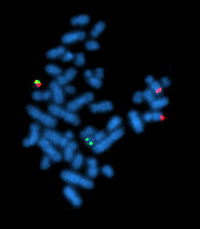
Photo from wikipedia
To improve the outcome of relapsed/refractory acute myeloid leukemia (AML), a randomized phase II trial of three novel regimens was conducted. Ninety patients were enrolled and were in first relapse… Click to show full abstract
To improve the outcome of relapsed/refractory acute myeloid leukemia (AML), a randomized phase II trial of three novel regimens was conducted. Ninety patients were enrolled and were in first relapse or were refractory to induction/re‐induction chemotherapy. They were randomized to the following regimens: carboplatin‐topotecan (CT), each by continuous infusion for 5 days; alvocidib (formerly flavopiridol), cytarabine, and mitoxantrone (FLAM) in a timed sequential regimen; or sirolimus combined with mitoxantrone, etoposide, and cytarabine (S‐MEC). The primary objective was attainment of a complete remission (CR). A Simon two‐stage design was used for each of the three arms. The median age of the patients in the FLAM arm was older at 62 years compared with 55 years for the CT arm and the S‐MEC arm. The overall response was 14% in the CT arm (5/35, 90% CI 7%‐35%), 28% in the FLAM arm (10/36, 90% CI, 16%‐43%), and 16% in the S‐MEC arm (3/19, 90% CI, 4%‐36%). There were nine treatment‐related deaths, seven of which occurred in the FLAM arm with four of these in elderly patients. We conclude that the FLAM regimen had an encouraging response rate and should be considered for further clinical development but should be used with caution in elderly patients.
Journal Title: American Journal of Hematology
Year Published: 2019
Link to full text (if available)
Share on Social Media: Sign Up to like & get
recommendations!